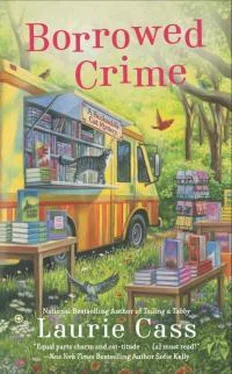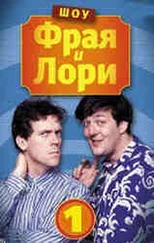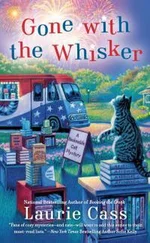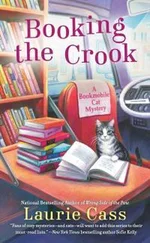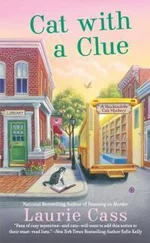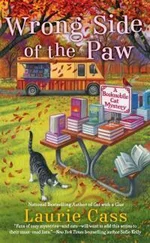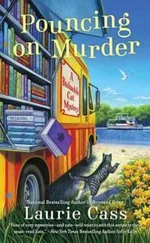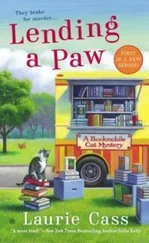There was the tiniest twinge of Mom-induced guilt that hovered in a back corner of my brain, but I told it to go away. Yes, I was at work and could have been expected to be, well, working, but keeping the bookmobile on the road was my job, too.
I grabbed my purse and, for the first time ever, left the building without telling anyone.
Forty-five minutes later, I was standing at the edge of the Jurco River, looking at the Jurco Dam. I was also shivering, because I wasn’t dressed properly. Jeremy had said he’d been here the day Roger was killed, and I’d seen his car about ten miles away from the gas station. If he was here at the time he’d said he been, there wasn’t enough time for him to get in place to shoot Roger, not with the condition of the gravel road I’d just traveled.
I glanced back at my poor little sedan, which was now coated with thick spatterings of mud, courtesy of the rutted road.
So now my only problem was: How could I confirm or deny the time Jeremy had been here? If he hated Denise enough, he might have overcome his aversion to blood and guns.
I stood at the end of the small dam, watching the water rush through, down, and away. Checking water levels , he’d said. Water levels above the dam? Below the dam? Both? There were so many things I didn’t know; dam knowledge was just one more.
“Hang on,” I said out loud.
There, fastened to the end of the dam, about three feet off the ground, was a metal object that looked like a really boring mailbox. I stepped sideways down the shallow slope toward it. The gray metal box was about eighteen inches tall and a foot wide.
I slipped on the slushy ground and slid sideways against the box, grunting as my hip hit a sharp corner. Score one for being short. If I’d been taller, the box would have smacked me in the thigh instead of my softest part.
“Please don’t be locked,” I said on a breath, feeling around for a catch on the box. “Please . . .”
My fingers found a fastener. With a quiet click , it released, and I swung open the door. Inside was a clipboard with a pen attached. On the clipboard was a stack of papers warped from dampness. On the papers were a series of numbers and dates and times and abbreviations.
I pulled the whole thing out and started studying.
“Hello.”
I jumped and almost dropped the clipboard to the wet ground. Up above me was a woman about my own age, dressed in a warm-looking dark knit hat, heavy boots, dark green pants, and dark green winter jacket, to which a gold shield was pinned. “Hi,” I said. “I was just, um, looking at the data.”
The conservation officer nodded. “Jeremy Hull’s work, mostly, but I take the readings when I’m over here. So does the other CO for the county, Officer Wartella. I’m Officer Jenica Thomas.”
Wartella had been the CO I’d talked to what seemed like months ago. “Really?” I asked. “Taking readings is part of your job?”
She nodded but didn’t say anything.
“This is my first time out here. Can you explain this?” I pointed to the sheet. “The dates and times I get, but some of these others don’t make a lot of sense.”
“No problem.” She scrambled down to me, sure-footed on the wet, muddy surface. “Date and time, as you said. Those are the initials of the person recording the data.” She pointed. “Next is an abbreviation for the weather condition. Sunny, raining, and so on. Then temperature, then the elevation above and below the dam, which is plus or minus from a mark on the dam wall.”
Now that it was explained, it all made sense. “How accurate are these?” I asked. “I mean, what if someone writes down a wrong number or something?”
Officer Thomas pulled in a breath. “Incorrect elevations should show up as an anomaly.”
“What if it was the wrong time?” I persisted. “What if it was, say, the time-change weekend and someone wrote down the old time instead of the right one?”
The CO considered my question seriously. “It’s possible,” she finally said, “but unlikely. The people trained to take these elevations are competent and conscientious folks who take this effort seriously. None of us is likely to compromise the data by making an error.”
“Why a clipboard?” I asked. “Why isn’t it entered into a computer?”
“It is,” Officer Thomas said. “We have an extensive data set for this monitoring project. We just like to have the paper copy in case it needs to be used in a court of law.” She waited a beat. “Do you have any other questions?”
“No. All set.” I tucked the clipboard into its home and shut the door. Jeremy couldn’t be the killer. I knew it for sure now.
* * *
A few minutes after I snuck back into my office, there was a knock on the door. Holly poked her head inside. “Minnie, it’s break time. I made cupcakes yesterday for Wilson’s classroom, and there are a few extras.”
“Sounds good,” I said vaguely, not taking my eyes off the monitor or my fingers off the keyboard. “I’ll be there in a little bit.”
Holly said something, I made an ambiguous noise, and she retreated, shutting the door softly behind her.
* * *
There was another knock on the door.
“I’ll be there in a second,” I said, still typing.
“Don’t go yet.” Mitchell slipped into my office and shut the door behind him. “Slipped” being a subjective word, of course, because it was hard for anyone that tall to be unobtrusive. “I got something to show you.”
“What are you doing here?” I squinched my eyes shut and opened them again. “Sorry, I didn’t mean it like that. It’s just that you’re never at the library before noon.” I leaned back, rotating my shoulders and flexing my fingers, all of which I suddenly realized were very, very stiff.
“True that.” Mitchell nodded seriously. “Why ruin a good morning by getting out in it, is what I say.”
I frowned and, for the first time in hours, looked at the clock on my computer. Half past one? How can that be?
“What’re you doing, anyway?” Mitchell came around my side of the desk. “Working? Hey!” He pointed to the monitor before I could bring up another file to cover what I was doing. “You’re working on who killed Roger, too.” He put his hands flat on the edge of my desk and started reading. “Huh. You got a lot of the same stuff I did, only with more extra stuff. Like lots of details.” He read the narrative I’d been constructing all morning, the story of everything I’d learned about Roger and Denise.
He grunted and stood more or less straight. “How come you’re doing this?”
For a brief moment, I considered confiding in Mitchell. Telling him about the library board’s ultimatum, about my flashes of empathy for Denise, about my guilt and my responsibility for Roger’s death, about the possible end of the bookmobile.
My sanity restored itself a nanosecond later. The absolute last thing I needed was Mitchell’s bumbling, though well-intentioned, assistance.
“Just trying to help,” I said. Which wasn’t much of an explanation, but with any luck, he’d accept it.
“Yeah, I can see that.” He nodded. “That’s like what I’m doing here,” he said, pulling a pile of yellow legal pad sheets from where he’d stuffed them inside his coat. “Can you guess what this is? Just read; see if you can figure it out.”
It was another multipage listing of names, and this one was even longer than the list he’d prepared of all the people Roger had ever known. Much longer.
I scanned the handwritten sheets. Most of the names I didn’t recognize, but every few lines I’d pick out one that I did. Pam Fazio. Kelsey Lyons. Josh Hadden. Don Weller. Holly Terpening. Jeremy Hull. Donna Beene. Allison Korthase. Bruce Medler. Sondra Luth. Otis Rahn. Shannon Hirsch. Stephen Rangel. Minnie Hamilton.
Читать дальше
